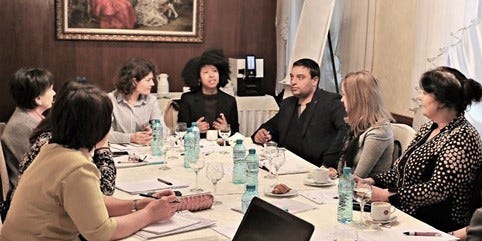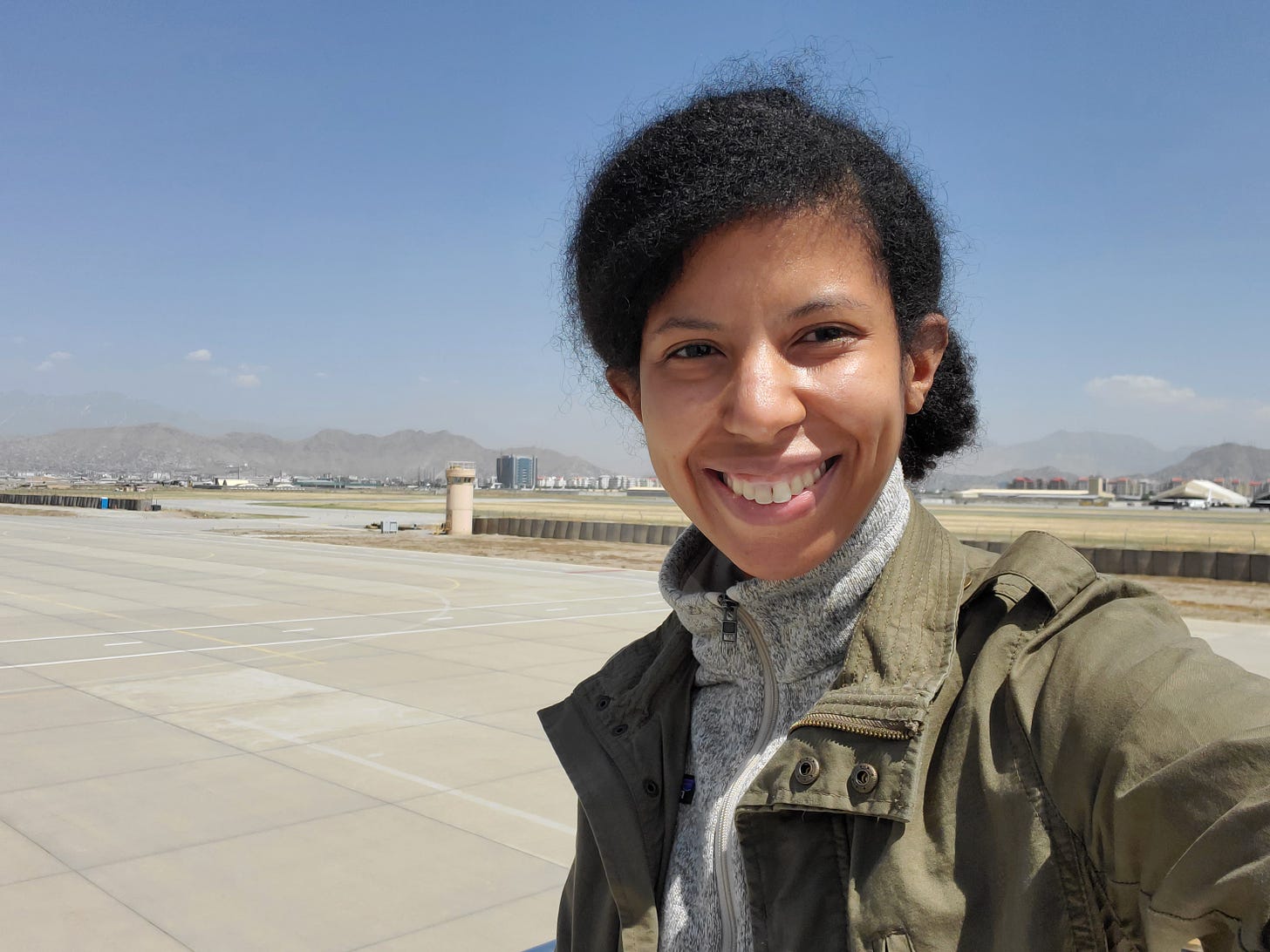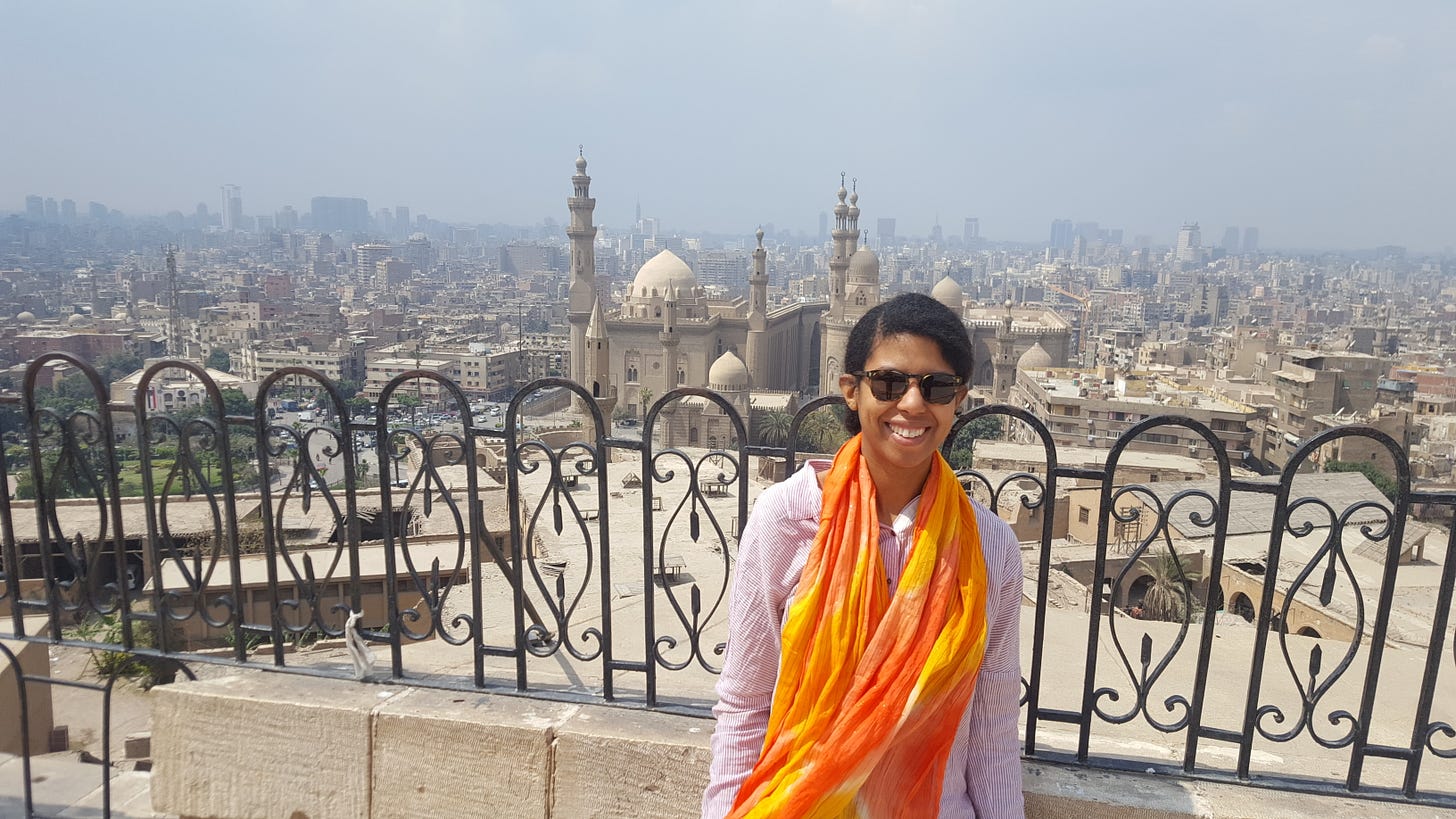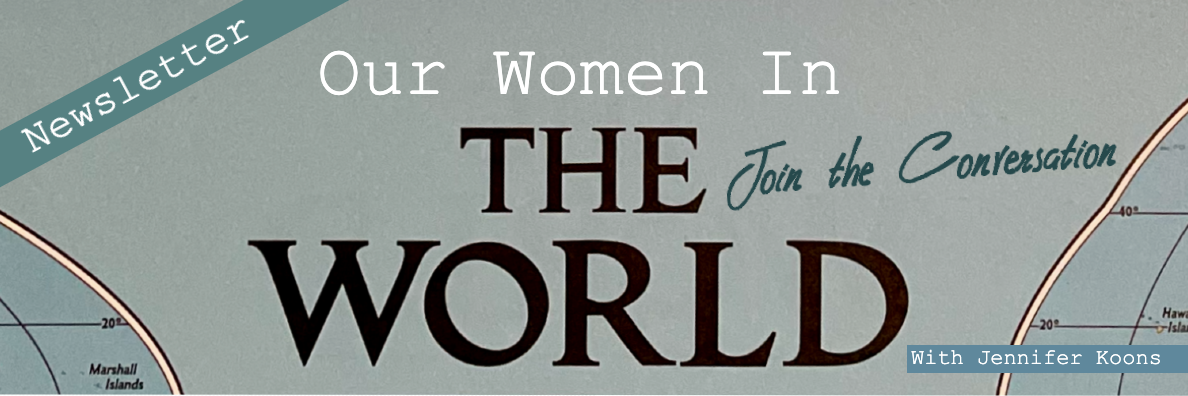In Conversation: M.J. Crawford
Echos of a familiar 'soul and history' from Michigan to Post-Soviet Nations.
Scents or sounds and, for M.J. Crawford, sights evoke a sense of home. Extensive travel and long-term postings in post-Soviet countries, for example, often induce memories of growing up in and around Flint, Michigan.
M.J., a Foreign Service Officer, previously led the human rights engagement strategy for the U.S. Embassy in Moldova and spent her first diplomatic tour assigned to the U.S. Embassy in Moscow. “There is a lot of soul and history to the region that echoes where I come from, but not a lot of Black Americans tend to travel there, which is a shame,” she tells me.
Now serving at the U.S. Embassy in Islamabad, M.J. finds depth and delight too in the lush capital city nestled in the Himalayan foothills. We discuss conducting diplomacy during a global pandemic, acting upon the value of inclusion and the repercussions of failing to do so, as well as the questions to ask when you take the lead. She also suggests a new query for future Q&As (hint: it involves your nightstand).
Please enjoy getting to know M.J.
When and how did you know you would be at home in the world?
I have been lucky to be able to travel to many different places around the world. Outside of my own home in the United States, I really enjoy living and traveling throughout the post-Soviet countries. I have either lived in or traveled solo throughout 12 of the 15 post-Soviet countries, including a few of the frozen conflict territories. There is a lot about this region that honestly reminds me of my home state of Michigan.
Flint and Detroit are both industrial cities and I have found a lot of similar machinery and styles of architecture while traveling throughout the old industrial cities of the former Soviet Union.
There is a lot of soul and history to the region that echoes where I come from, but not a lot of Black Americans tend to travel there, which is a shame. The people I met along the way were very kind.
Can you share how your early years and your upbringing impacted your dreams and desires?
I am an immensely curious person, who has always enjoyed learning new things. I was born and raised in Flint, Michigan, which was the perfect location for me to try out literally every single individual and team sport you can imagine — or pursue activities in art, music, and drama.
Overtime, I decided to stick with competitive figure skating, soccer, and Tang Soo Do — a Korean martial art form. I did almost all of these sports with my two younger brothers, and my father even joined us for martial arts. My mother was the one who would wake me up early before dawn to drive me to the skating rink for lessons before school began. This taught me that any dream worth pursuing will inevitably involve inconvenience and sacrifice.
In addition to sports, I grew up very civically engaged in my hometown. My parents, friends, teachers, and people I met throughout my childhood were always so committed to making Flint be a place where young people could have any opportunity they wanted so that they could go on to pursue their dreams — first through college and from there, by doing anything else in the world they desired.
I’ve faced a lot of setbacks in my childhood, but they’ve only made me more resilient to setbacks faced as an adult. Along the way, I’ve learned not to take hardship too seriously, because eventually, things will get better.
What would you say are the three characteristics of a successful Foreign Service Officer?
Looking at the career from the inside out, the top skill I would say makes successful Foreign Service Officers is the ability to relate to and get along with other people on a truly human level — no matter their background, language, political views, etc. Being a diplomat requires cultivating real relationships both internally among colleagues and externally with citizens of the host country.
A second skill that helps is understanding and acting upon the value, ‘inclusion.’
For any meeting that happens, whether it’s on a policy issue, a procedural issue, or a personnel issue, whoever is leading that meeting needs to always ask — is everyone who needs to be a part of this conversation here right now? Were they invited? Do I have every necessary perspective on this topic represented? It helps to prevent blindspots.
And finally, in the Foreign Service we change jobs every 2-3 years and having a life and career overseas can be unpredictable. I would say that the ability to accept uncertainty and keep faith that everything will eventually work out is a helpful trait in a Foreign Service Officer.
What do you think would surprise people the most about your life — both personally (behind-the-scenes) and on the job?
Well, I am living and working at the U.S. Embassy in Islamabad, Pakistan, right now, and people often ask me what my life is like here.
Islamabad as a city is a surprisingly very green place, with beautiful green mountains and trees and plants everywhere. Of course like many places, much of our work has been affected by the coronavirus pandemic.
Despite the challenges, however, we are working hard to continue important work here, and find virtual ways to build people-to-people ties. I have had the pleasure of working with phenomenal American and Pakistani colleagues and am learning something new every day.
Recently, someone on a discussion board asked for the best tips to combat imposter syndrome. So many responded with fantastic and even funny suggestions. But it struck me that it's something so many wrestle with at various points but so few discuss. Have there been moments when you've struggled with imposter syndrome? What would present-day you advise?
Honestly, I had never heard of or felt anything close to this. This is a good opportunity, however, for me to share an article recently published in the Harvard Business Review, ‘Stop Telling Women They Have Imposter Syndrome,’ by Ruchika Tulshyan and Jodi-Ann Burey.
Instead of that, I will tell other women and/or people of color that you are worthy and you are deserving of everything good that comes your way.
You are worthy and are deserving of every opportunity you desire now and in the future, simply because you are a human being. Only embody and visualize the positive and discard whatever else that does not serve you.
At the same time, what are some of the moments that stand out to you when you felt fully "in the zone" in terms of your ideas or accomplishments? Can you explain that rush or exhilaration of knowing you were the exact person to handle a given situation or resolve a tough problem?
In my previous diplomatic post working as a Human Rights Officer at the U.S. Embassy in Moldova, I had the privilege of working with so many incredible groups, ethnic and religious minorities, the LGBTQI community, survivors working to end trafficking-in-persons, and countless human rights activists working tirelessly to make their country a better place.
As a Black American woman who cares deeply about human rights, equal participation in the democratic process, and freedom for religious and ethnic minorities, I was the exact sort of person who could successfully understand, communicate, and advance many of our mutual goals for advancing human rights in Moldova. By the end of my time there, I saw many positive changes.
Can you talk a bit about your support network and those people and/or groups in your life that bolster your confidence or remind you of your ambition and desires?
I try to surround myself with positive people and those who I would like to emulate, no matter what age they are. My parents, family, and husband remain a constant source of support in my life.
My life has already had so many chapters. For example, living in different states or countries over the years, I remain close to the friends and co-workers I was with at the time who knew what it was like living in New Jersey working for the Federal Emergency Management Agency during Hurricane Sandy, or living in Pakistan during COVID-19, etc.
I have a great group of friends from high school in Flint and college at Michigan State who remind me of the person I was before I ever joined the Foreign Service. They keep me grounded and keep me laughing.
If we were having this conversation 10 years from now, where would you hope to be? Describe what your professional (and personal) life might look like at that time.
I definitely have long-term personal and professional goals, but I intentionally do not place a timeline on them.
Personally, I want my husband and I to raise a family and live in as many different countries as we can. Professionally, I would love to lead an embassy or other organization, as the leader really sets the tone for what kind of work environment employees experience.
I want to ensure that whichever embassy or organization I lead one day, it is a place where people will wake up excited to go to work and ultimately see that their ideas and contributions are valued and implemented. I am excited to see what us millennials will accomplish once we start leading organizations, particularly in the government sector.
What is a pressing foreign policy issue that you think is too often misunderstood, overlooked or ignored?
I think we really need to take a hard look right now at certain domestic policies and how they will ultimately impact our national security and overall ability to carry out successful foreign policies.
For example, right now a large segment of Americans, particularly those who are Black and Brown, lose out on the opportunity to join the ranks of the American military, foreign affairs agencies, or even contribute meaningfully to the American economy. Why?
Many are not provided quality K-12 education and are disproportionately represented in the mass incarceration system. The United States has to reduce domestic socio-economic disparities based on race, or failing to do so will threaten our national security. For example, the U.S. will not have the necessary human capital to militarily or economically compete with rising powers — having a felony permanently bars Americans from joining the U.S. military and in some states they aren’t allowed to start and run their own business.
Additionally, we won’t have enough qualified citizens to defend our country against an increasing array of threats, including but not limited to: cybersecurity, climate change, or nuclear, biological, or chemical threats.
We must prioritize our national security by ensuring that the entirety of the U.S. population is educated, employable, and whole.

What question do you wish I’d asked you (and which you’d love to hear someone else answer)? Please share your question (and how you’d personally answer it, plus: who you think I should ask to share next).
I always love asking or being asked about what people are currently reading, or if they have any reading recommendations! Response below:
I love reading books on a lot of different topics. I love 20th century African American literature (I Wonder as I Wander by Langston Hughes), Russian and Post-Soviet Literature (Secondhand Time by Svetlana Alexievich), biographies (Mr. Ambassador: Warrior for Peace, Autobiography of Ambassador Edward J. Perkins), and books on leadership and personal development (The Power of Your Subconscious Mind, by Dr. Joseph Murphy). I included a recommendation for each category!
M.J. Crawford is a Foreign Service Officer currently serving at the U.S. Embassy in Islamabad, Pakistan. Previously, M.J. designed and led the human rights engagement strategy and reporting for the U.S. Embassy in Moldova as the Human Rights Officer.
In 2019, she was twice seconded to the Organization for Security and Cooperation in Europe (OSCE) to monitor parliamentary elections in Moldova and a nation-wide presidential election in eastern Ukraine. Her first diplomatic assignment was to the U.S. Embassy in Moscow, Russia.
Previously, M.J. was a Legislative Fellow with the Senate Foreign Relations Committee assisting congressional oversight of U.S. policies in South and Central Asia and Africa.
M.J. has a Master of Science in Foreign Service from Georgetown University with a certificate in Russian, Eurasian, and East European studies. She obtained her B.A. in International Relations from Michigan State University's James Madison College. From 2010-2011, she was a Boren Scholar at Bogazici University in Istanbul, Turkey. M.J. speaks Turkish, Russian, and Urdu.
All views expressed in the interview are her own and not necessarily those of the Department of State.
Know a Woman in Foreign Policy Who Should Join our Conversation?
Share in the comments below or email me at jennifer.koons@protonmail.com.








